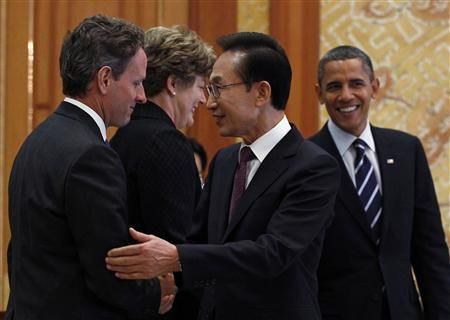US-South Korea free trade pact trips over autos, beef

The U.S.-South Korea free trade talks broke down as the two sides failed to resolve principal differences over U.S. beef and auto exports to South Korean markets, but Presidents Barack Obama and Lee Myung-bak said they still hoped the deal could be clinched.
U.S. Trade Representative Ron Kirk said the failure to reach accord on the pact was not a setback for President Obama. He said the U.S. wanted to make sure there are reciprocal advantages from the deal. President Obama has been clear that we want the same access to their free markets as they have to ours, Kirk said, according to media reports, suggesting that the U.S. was holding on to demands critically important to protecting U.S. jobs and exports.
President Obama had set high hopes on ratifying the trade deal with Seoul, which was signed by George W. Bush in 2007, saying the deal would be worth tens of billions of dollars in increased exports and bring prosperity and jobs to the U.S.
The main hurdle was the issue of auto exports, though there were other issues as well, Mike Froman, an economic adviser to President Barack Obama, said, according to a Reuters report. Autos is a major outstanding issue and we've spent a great deal of time on autos in the last four days and will be continuing to work on that issue as we go forward, Froman told reporters in Seoul.
The Obama administration was planning to submit the renegotiated Korea Free Trade Agreement to a vote in Congress in late 2010 or early 2011 but the failure to reach agreement in Seoul will stall the pact further.
Ratification by the U.S. Congress eluded the deal as it faced strong protests over clauses on auto and beef exports to South Korea. Obama and the Democrats opposed the deal in its original shape and the President had said during his election campaign that he wanted to alter parts of the deal unfavorable to the U.S.
In June, the President sent Trade Representative Ron Kirk to Seoul to negotiate with his South Korean counterpart Kim Jong-hoon and reach agreement over outstanding issues. The two sides had until Thursday to finalize a new deal, but the landmark agreement fell through, dashing hopes of a podium finish at the G-20 summit.
KEY HURDLES
When the deal was signed, South Korea had agreed to phase out a 40 percent duty on beef imported from the U.S. over a 15-year stretch. However, a Korean ban on U.S. beef imports, which was imposed after the mad cow syndrome scare of 2003, was partially in place, making a U.S. Congressional nod for the deal nonviable. President Lee Myung-bak's controversial decision in April 2008 to allow imports of all cuts of beef and beef products triggered fierce protests in Korea.
The government bowed to popular concern over safety and rolled back the decision, but allowed the import of U.S. beef from cattle younger than 30 months. However, sizable chunk of U.S. lawmakers still wanted Korea to let imports of all cuts of U.S. beef.
The U.S. auto sector also came down heavily on the 2007 proposals, saying many non-tariff barriers imposed by South Korea have kept U.S. automakers outside its market. The Bush administration had agreed to abolish a 2.5 percent tariff on Korean cars and also phase out a 25 percent duty on pick-up trucks over 15 years.
Seoul had agreed to withdraw the 8 percent duty on U.S-built passenger cars and a 10 percent tariff on pickup trucks.
However, the detractors of the deal had wanted the elimination of the 2.5 percent duty on Korean cars to happen over a stretch of 15 years.
IMPACT ON JOBS AND DEFICIT
President Obama has said the renegotiated deal would bring jobs to the U.S. and boost exports to South Korea. He has also highlighted the fact that U.S. is fast losing out on trade with the emerging Asian nation. China replaced the U.S. as South Korea's largest trading partner in 2004 and Seoul has clinched landmark trade deals with the European Union and Canada and is making progress on similar deals with other nations.
The change in domestic political power balance after the mid-term election in the U.S. has made the passage of the deal in Congress easier than before as the Republican majority had favored a trade deal with Korea. But the Democrats still fear the deal could lead to more job losses and factory closures.
Public Citizen, a research and lobby group campaigning against the implementation of Bush-era FTA deal, has said studies have revealed the deal would lead to a spike in deficits and loss of thousands of jobs. Quoting a study by the Economic Policy Institute, it says the pact will boost deficits and cut jobs.
A study by the Economic Policy Institute has examined this question of the employment impacts of implementation of the Korea FTA. The study examined the U.S. historical experience with major changes in bilateral trade policy – namely changes in trade flows with Mexico and China after NAFTA implementation and Chinese WTO ascension, respectively – to determine the likely impact of the Korea FTA on trade flows.7 EPI found that the implementation of the Korea FTA would boost the U.S. trade deficit with Korea by $13.9 billion over the next seven years.8 This rise in the trade deficit, in turn, would cost the U.S. economy about 159,000 net jobs.
Quoting a United States International Trade Commission (USITC) study, it also says that jobs may be lost in many high-wage industries, including auto manufacturing and electronics manufacturing.
© Copyright IBTimes 2025. All rights reserved.





















